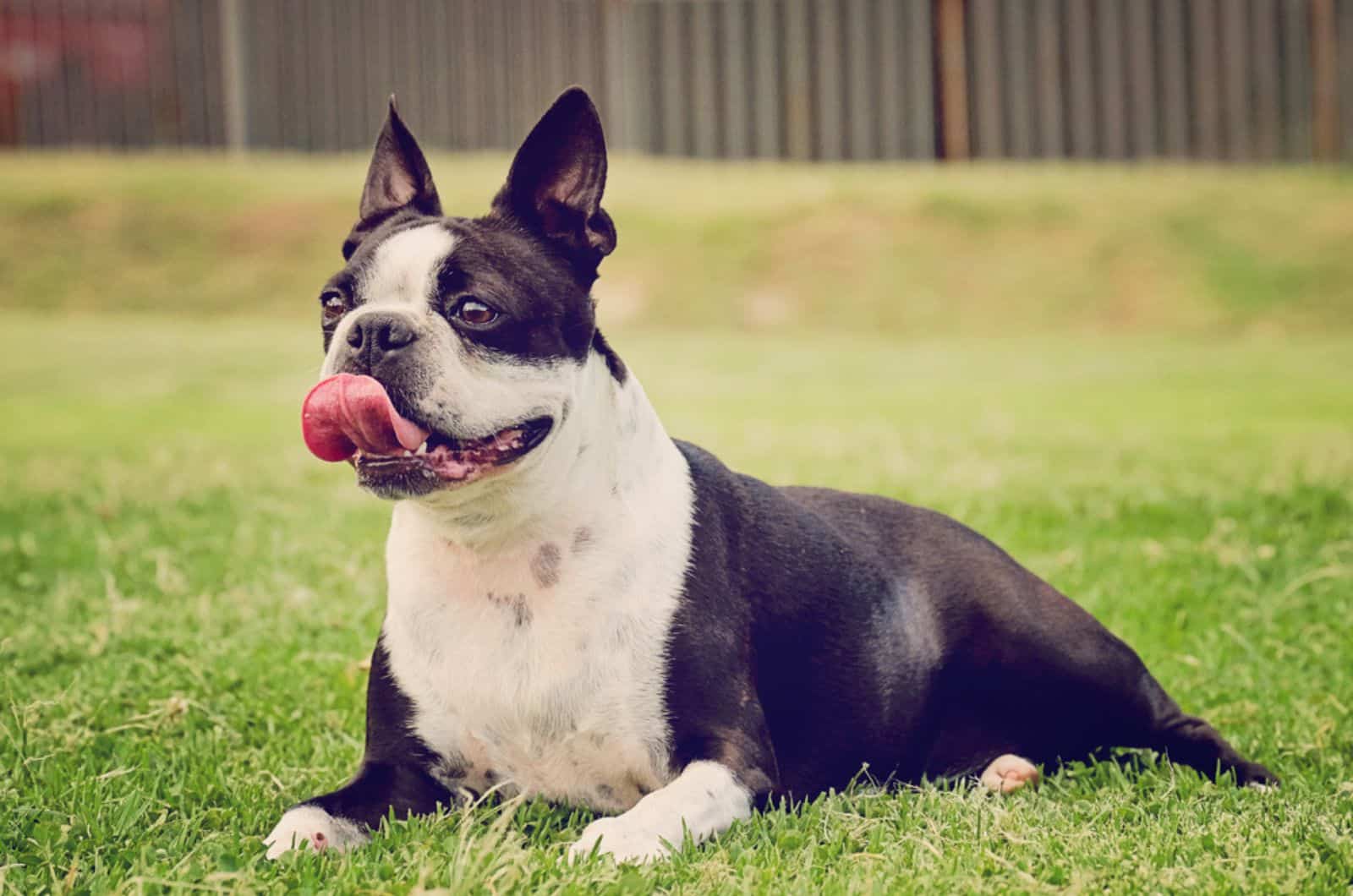Boston Terriers are one of the most amazing dog breeds that are best known for their great manners and generally friendly demeanor, but many people often ask themselves how long is the Boston Terrier lifespan.
Well, the standard Boston Terrier lifespan reaches an average of 11 to 13 years, but the life expectancy can be influenced by a variety of different factors.
The first and foremost is the dog’s brachycephalic nature, meaning they have great difficulty breathing due to their flattened face.
Aside from that, their overall diet and levels of exercise are other key factors, but there are a few other ones worth noting.
However, as pets, your dog can’t really influence these things on his own, he has you to take care of these needs for him, which is why I’m here today to help you maximize your dog’s overall life expectancy.
After all, all dog owners wish to see their beloved pets live for as long as they do, but, seeing how that’s not really possible, we all strive to give them the best and longest lives that we can provide them.
Keep in mind, however, that the given estimate is just that, an estimate, and it can vary wildly from pooch to pooch depending on potential complications or unforeseen circumstances.
So, if you’re curious on everything that affects the Boston Terrier breed’s lifespan, whether it be positive or negative, and finding out ways on how to mitigate the effects of said negative influences, keep on reading.
The Boston Terrier Lifespan: 5 Greatest Influences

The Boston Terrier breed, despite its slightly higher than average lifespan compared to other breeds, isn’t exactly the apex example of a dog in terms of health and many other factors.
All of these have some sort of influence on this tuxedo coated gentleman’s lifespan. Here are some of the more prominent ones:
1. Genetics
Genes, as with any other living creature, play a vital role in determining the being’s predisposition toward many potential health issues, be it a lower immune system, how fast its metabolism is, whether or not there will be any present defects and similar.
The same applies to your precious pooch. Sometimes they simply get dealt a bad hand and end up having all sorts of issues that need frequent check-ups and treatment, and sometimes they come out perfectly healthy barring the flat face.
As I’ve mentioned at the start, Boston Terrier dogs, much like the French Bulldogs and the Pugs, are a brachycephalic breed, the medical term for a dog having his snout squished into his face like these dogs do.
This already gives them a nasty drawback all throughout their lives due to the currently desired breed standard as set by the American Kennel Club as well as breeding practices that have spanned since the breed’s inception.
Sadly, there isn’t much that can be done in regards to minimizing the flare-up of genetic problems directly.
However, you can always be on the lookout for any issues that may arise due to them and treat them accordingly. Early detection and reaction can help out greatly in some cases
2. The Environment That They’re Raised In
The second factor that may help increase or decrease your Boston Terrier’s lifespan is his surrounding environment.
If he’s raised in a busy city with an industrial area with little to no greenery, or one that’s known to have a lot of smog or is known to have extreme temperatures for a good part of the year, then chances are your dog is going to suffer.
Air quality especially is going to play a big part in how long a dog who can barely breathe as is lives.
Air filled with all sorts of nasty pollutants and other particles is bound to cause lots of disease and other complications if given enough time.
Sure, it’s no sunshine and rainbows for anyone else either, but it’s worth stating the obvious.
Other than that, you don’t want air to be too hot or too cold as it’ll make breathing harder, which, for a brachycephalic breed, is going to be a nightmare scenario.
The same goes for extremely humid conditions, the American Gentleman simply isn’t built for such environments and they should be avoided if at all possible.
3. His Diet
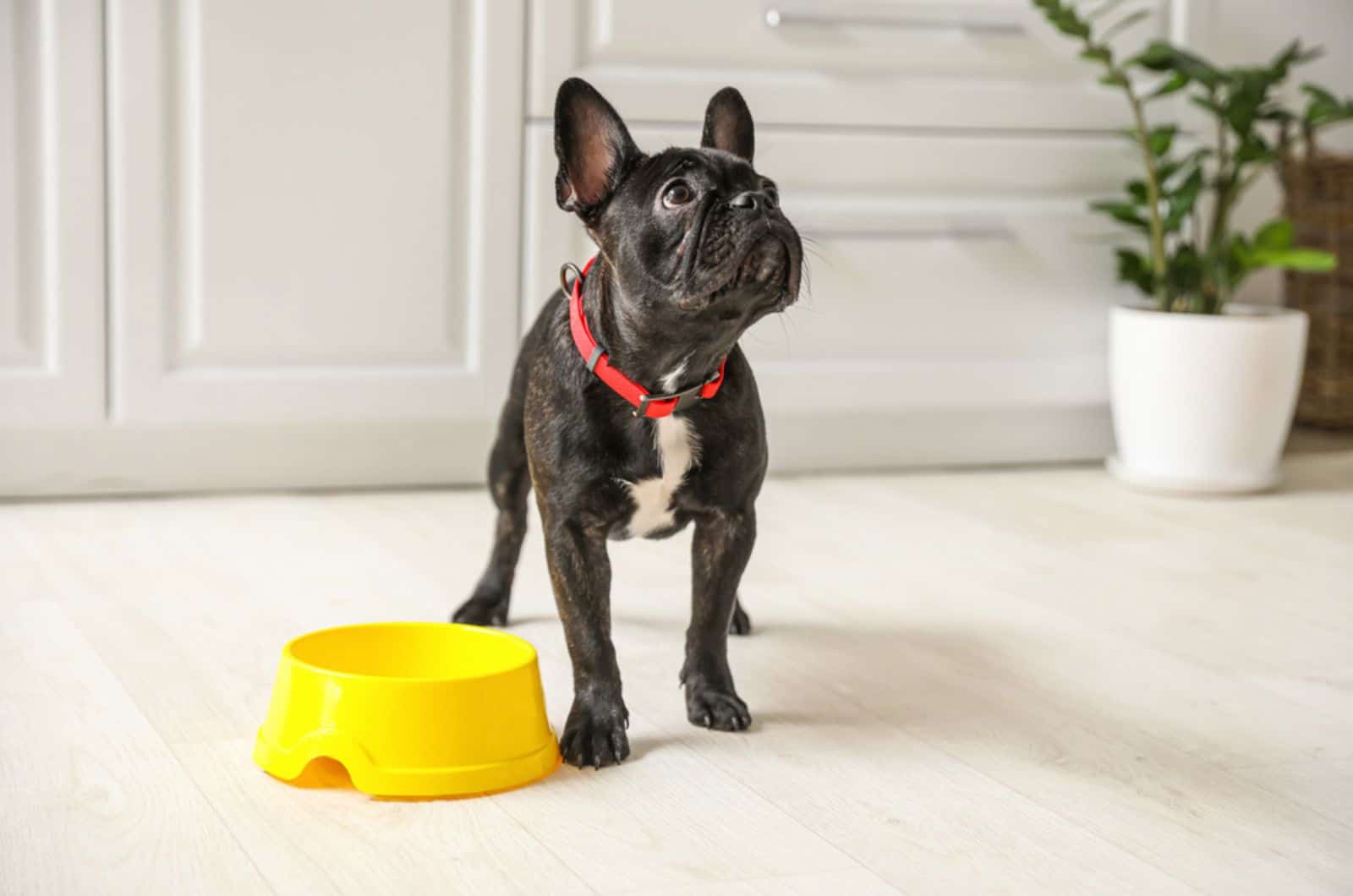
Food is a core need of every living being, and maintaining a healthy lifestyle involves following a healthy and balanced diet and maintaining a healthy weight.
For Boston Terriers, the average amount of food that should be consumed daily varies from 1 to 1 and 3/4 cups of high quality dry dog food, depending on age and size.
When he’s a pup, you’ll want more calorie rich, pup-oriented food to ensure a healthy level of weight gain, but you’d need to slowly transition him out of it as he starts reaching adulthood to stuff with a more balanced mix of ingredients.
Speaking of weight, the ideal average for the breed is around 10 to 20 lbs for a female representative, and around 15 to 25 lbs for a male one, give or take a few pounds.
Obviously, the number changes still based on growth factors with genes playing a pivotal role again, but try playing around that area and following a weight chart for your pooch if you can.
It’s extremely important to not reach a point of obesity or malnourishment as small dog breeds take these excess pounds, or lack thereof, a lot worse than large dog breeds would given the percentage difference.
3 extra pounds for a 120 pound dog isn’t the same as 3 extra pounds for a 25 pound dog.
It’s a bigger percentage and can leave your poor dog to act sluggish and to have even more difficulty breathing, not to mention being more liable to health disease and artery clogging.
4. His Levels Of Exercise
A good way to maintain a healthy weight and to reduce the chances of any detrimental health conditions popping up is to keep up with your dog’s daily exercise needs.
Despite being so small, considered a non-sporting breed, and, even with his breathing problems, the Boston Terrier still needs around one hour of moderate levels of exercise a day.
This can involve either walkies or active play, a strong mix of both is recommended.
It’ll help improve both his physical and mental health by allowing his whole body to get a workout and will help alleviate stress and anxiety from your canine companion, leading to a healthier lifestyle and a longer life expectancy on average.
Boston Terrier puppies need a lot less, measured in around 5 or so minutes of exercise per month of age, gradually building up to the hour when they hit their first birthday.
Ones who’ve hit old age at around year 7 or 8 will need a little less than the standard too, but it’ll still roughly be around 45 minutes to an hour.
These are all rough estimates too, your dog may need less or more depending on his levels of activity.
I’d suggest visiting a vet or a professional pet trainer to better determine the correct amount needed, or to simply find out through trial and error.
However, pay attention to your dog’s behavior during the exercise period, and cut it short if he seems to be having extreme trouble with his breathing.
Do all of this, and your doggo may just end up living a few years of age past the intended average lifespan of a Boston Terrier.
5. Various Health Issues
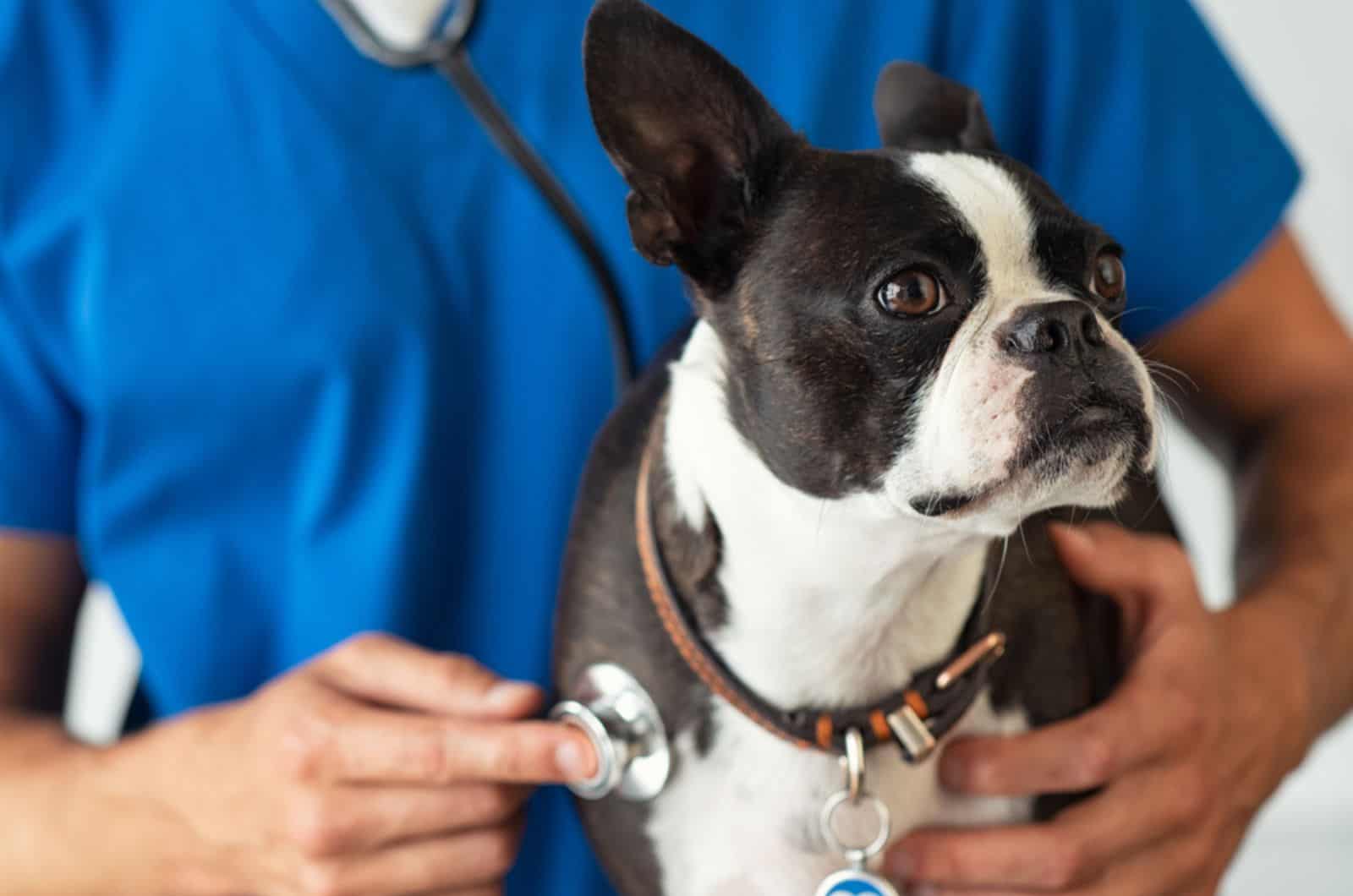
Boston Terrier health is a major contributor to lower than average life expectancy, and it’s good to be well acquainted with everything that can happen to him in order to minimize the damage some of them can cause.
Once again, early detection and prevention will be the key to your pet’s long life. Some of these you can influence for the better and prevent entirely, and for others you can only try and minimize their impact on your Terrier’s life.
Here are some of the more common health problems to be on the lookout for:
Deafness
Deafness is common in Boston Terriers and is hard to detect on your end unless you notice your dog being less responsive to commands than usual.
It happens gradually as he ages which makes it even harder to spot.
That said, your dog’s deafness may not be caused by some untreatable issue and it could just be temporary due to an ear infection or a build-up of earwax.
Make sure he gets his ears cleaned regularly to prevent these from becoming a bigger problem.
The other side of the coin is congenital deafness, with dogs potentially being born deaf in the litter.
They’ll need special care which, hopefully, you can provide.
Patellar Luxation
Patellar luxation is another problem Boston Terriers are more likely to suffer from, an issue best known as a dislocated kneecap.
It doesn’t happen at birth for most dogs, but over time, through a lot of wear and tear, the kneecap moves away from its intended position and starts causing problems with your dog’s affected leg and walking in general.
The condition, thankfully, is treatable, if caught on time and if not allowed to become too severe.
The primary cause for this problem is being overweight and is one of the many hazards that having a few extra pounds does to a small dog like the Boston Terrier, so the prevention method becomes pretty obvious, healthy dieting and exercise.
General Bone And Joint Problems
Something that comes with old age, but that can be affected by weight problems are aches in both bones and joints and them eventually getting worn down from use and the stress they’re under.
It’s an inevitability the older your dog gets, but eating food rich in chondroitin and glucosamine helps reinforce both joint and bone tissue which can help slow the regression process down.
Megaesophagus
Another condition that may not be familiar to all that Boston terriers can suffer from is a Megaesophagus, something that can be debilitating if left untreated.
To put it simply, it describes a condition where your dog’s esophagus doesn’t have the muscles to help push food down, and instead lingers inside and often gets regurgitated, which can lead to malnourishment and general difficulty eating.
While this has been the cause of death for a number of dogs in the past, it’s a treatable condition now, but not a curable one unfortunately, so you’ll have to make sure you care for your furry friend as best as you can.
Various Eye Problems
If there’s one thing that Boston Terriers suffer from the most, it’s having to deal with issues that affect their eyesight and eyes in general.
Corneal ulcers, cherry eye, glaucoma and cataracts, they’re prone to them all.
The first one is self explanatory, an ulcer that grows on the cornea and can have varying degrees of severity.
Normally it’s treated with simple antibiotics and isn’t the biggest deal.
Cherry eye is a bit more serious as it’s a prolapse of the tear gland which will cause irritability and potentially permanent damage to their eyes.
The treatment involves surgically replacing the gland to remedy the issue entirely and the sooner it’s performed, the better.
Glaucoma is caused by fluid build-up in the eye most commonly, or anything else that can cause a sudden increase in eye pressure.
This manifests itself as a severe redness in a dog’s eyes and should be treated before any potentially permanent damage is incurred.
The treatment can be either through eye drops or a surgical maneuver.
Finally, cataracts is the progressive clouding of the ocular lens which can only be treated through a surgical procedure called phacoemulsification, and should be performed so your dog doesn’t end up developing glaucoma and to help restore his eyesight.
Heart Problems
Problems that directly affect your dog’s lifespan are ones tied to their heart and are one of the leading causes of death in Boston terriers.
Be wary of potential heart failure and general heart disease in your pooch and look for any abnormal behavioral signs that may point to a problem so you can hopefully prevent this from happening.
Various Neurological Problems
The list may seem long, but, as I’ve said, the Boston Terrier is unfortunately prone to a good number of issues.
After heart disease, one of the other most likely causes of death tend to be various neurological issues like seizures and meningitis which can take your dog out on the spot and can be relatively difficult to spot.
For this one, all I can really recommend is that you take care of your dog as best you can while consulting your vet for potential preventative measures that can be taken or warning signs.
Brachycephalic Syndrome
The first thing I’ve mentioned at the start is how Boston Terriers are but one of many brachycephalic breeds, breeds who have a flattened snout which makes it a lot harder for them to breathe.
This is further worsened by poor air quality in his surroundings as well as extremely hot, humid or cold weather.
It also doesn’t make it easy for him if he’s exerting himself, not allowing him to feed oxygen to the body while expelling the carbon dioxide out as quickly.
This can lead to further complications down the line, and is ultimately one of the breed’s biggest problems.
While surgery can improve the condition a little, they’re stuck with this for life until breed standards start to change and people stop breeding them with such a defect for the sake of ‘aesthetic’.
Cancer
Finally, the issue that isn’t exclusive to Boston Terriers, but is still worth mentioning, are the various forms of cancer that can affect your small boy.
Cell tumors are the most common ones in Boston Terriers.
While there’s still no proper cure for cancer at the time of writing this, early detection does a great deal, so if you find any abnormal growths that you can spot on your canine companion or any lumps, be sure to get them checked out.
It may just save your dog’s life.
How Long Do Boston Terriers Live For?
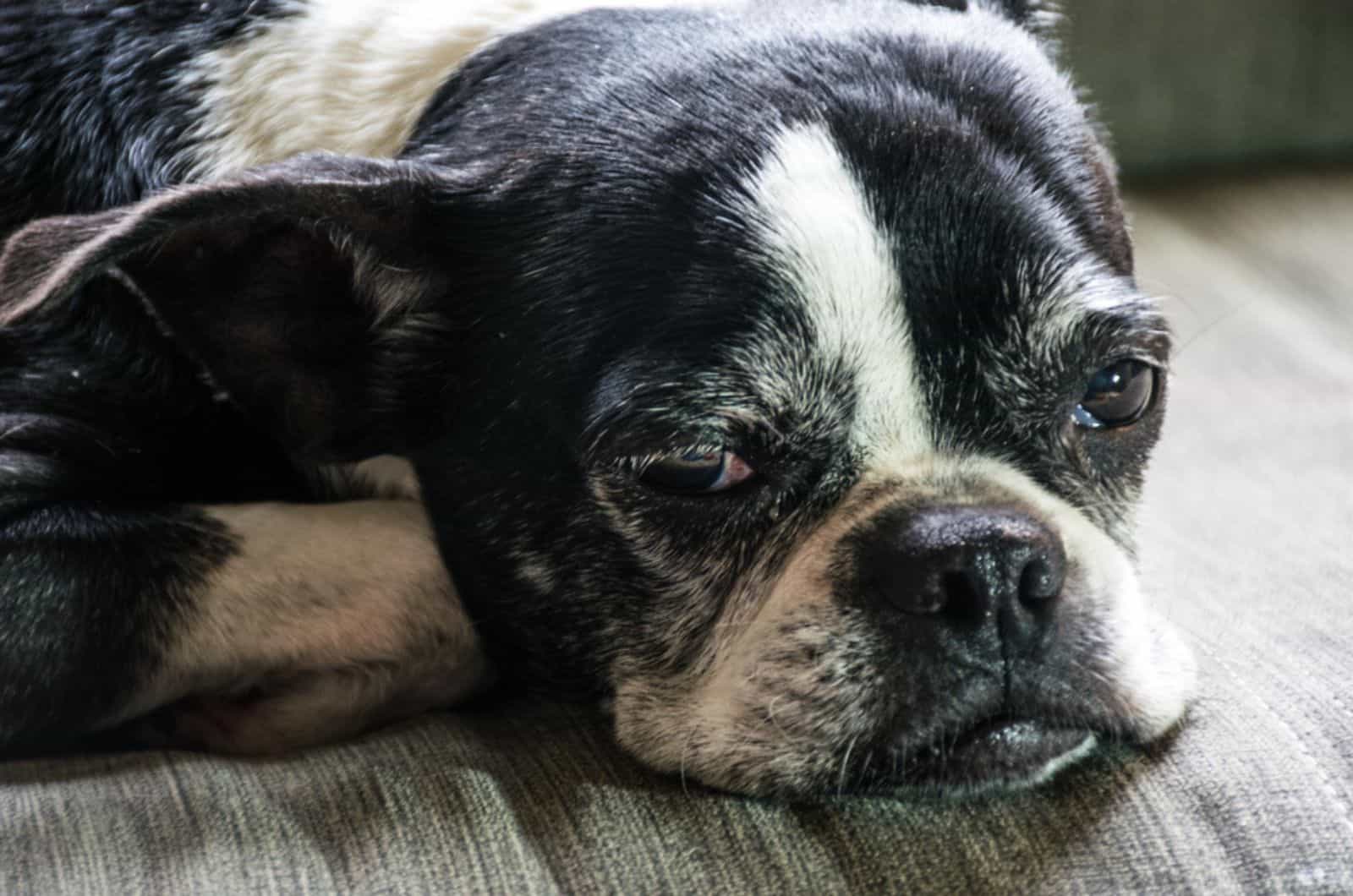
It may seem like Boston Terriers have a lot of issues on their hands, and they do, but the average lifespan still firmly sits at that 11 to 13 year mark that I’ve mentioned.
But, as you can see, there are a great number of factors that can influence that, some impacting the average mildly, and some more severely, for better or worse.
Can I Do Anything For My Pet In That Regard?
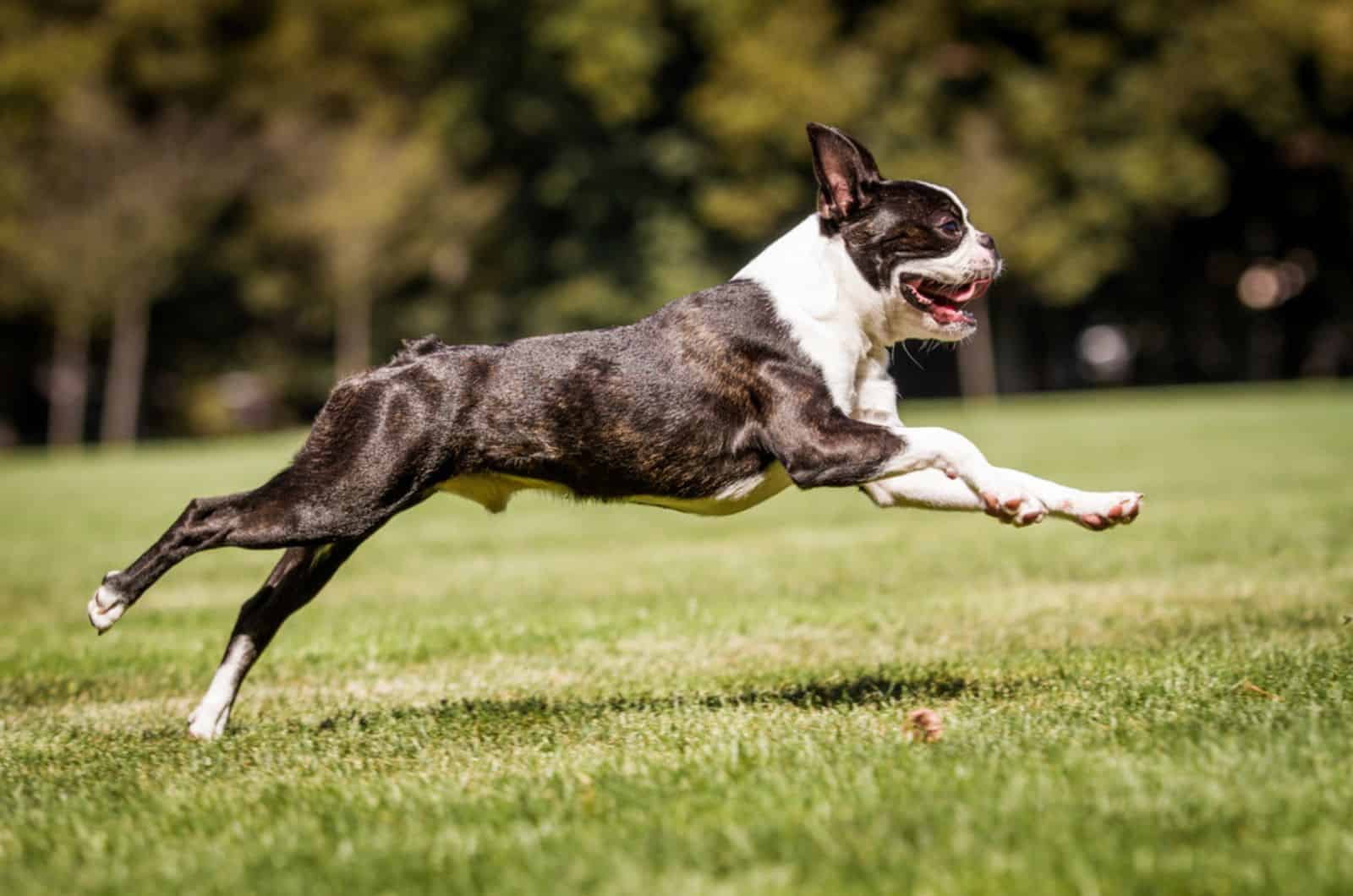
You most certainly can, as you’ve seen from some of the suggestions up above, but there are a few other things aside from those that can be of great help in keeping your Boston Terrier’s life expectancy high.
1. A Healthy Diet And Plenty Of Exercise
The most obvious ones are a healthy diet and good amounts of exercise.
These are key factors in helping both maintain your Boston Terrier’s weight at an ideal weight range as well as keep his body healthy through proper nutrient consumption.
But again, remember that you can’t go overboard with exercising due to the Boston Terrier’s innate breathing problems.
As far as food goes, it’s best to stick to high quality dry dog food if you’re a first time dog owner, as long as you make sure to get a brand that doesn’t use any fillers, meat by-product and various artificial ingredients or common allergens in its formula.
The reason why I’ll always recommend dry dog food as the majority of a dog’s diet, regardless of breed, is that it offers no salmonella risk as opposed to raw diets which often get paraded around as the healthiest and most natural option.
Sure, there’s truth in that, and it would definitely be the best if we weren’t considering modern food production standards where a lot of competitors utilize all natural ingredients in production.
They also contain a lot more nutrients than a raw diet could provide, and in much smaller amounts.
Aside from that, a lot of first time dog owners won’t really know how to balance a raw diet properly, so I’d advise reading up on it over time and then trying to introduce it later if you so wish, but dry food is ultimately the best and simplest option still.
That doesn’t mean you can’t mix in some of the raw stuff here and there like bone broth to give the kibble some moisture or cook bones to kill any potential bacteria from them before giving them to your pooch.
2. Vaccinations And Check-ups
It also helps if you stay up to date with your dog’s vaccinations and other regular check-ups to help reduce his odds of contracting something potentially dangerous as best you can.
It’s also a good idea to invest in some pet insurance.
Sure, it may seem like an unnecessary down payment at the start, but dog’s can get sick just like humans can, and the long list of Boston Terrier health problems shown beforehand should be plenty of evidence for getting the insurance.
It’ll help in severely reducing the costs of treatment should something happen and will pay itself out over the course of his life.
3. Good Breed History

Another secure measure you can look at is getting a pup who has a history of healthy ancestors, parents in particular are the most important.
This way, you can somewhat secure the genes being less predisposed toward the aforementioned health problems.
In order to ensure the papers of the parents are legitimate, it’s best to stick to reputable breeders who prioritize the dog’s health unlike shady breeders and the various puppy mills who are just looking to produce dogs en masse to earn a quick buck.
4. Give Him Plenty Of Love And Attention
Mental health is equally as important as physical health which is why showing your dog that you care for him is key.
Give him cuddles, play with him, praise him for his achievements, have him spend time with other dogs and young children at a young age so he can properly socialize.
Being surrounded by others who recognize his accomplishments and who simply enjoy being around him will help improve his mood greatly which can affect physical health in a positive way too.
I know it may sound silly, but it’s the same for them as it is for us. Dogs are social animals and do better when they get to be social.
5. (Optional) Spay Or Neuter Your Dog
Finally, spaying or neutering your dog may help out with dealing with some UTIs as well as preventing prostate cancer on the male side of things.
However, the procedures aren’t without their own risks, the procedure should only be done when your dog has fully grown as the hormones produced by their reproductive organs play a part in his growth too, oddly enough.
Cutting them off beforehand can have a detrimental effect and can cause abnormal growth with your pet.
The safest period when it can be done is when your dog officially reaches adulthood, but even then I’d still ask your local vet to determine whether or not it’s safe as some Boston Terriers may be late bloomers.
Other than that, there’s also the increased risk of other types of cancer like bone or hip dysplasia, so do know that it’s a double-edged sword, one that pets don’t particularly like.
Only do it in case your dog’s hormones start causing behavioral problems or any other justifiable reason.
What Constitutes As Healthy Food?

I’ve said that dry dog food is really good for your dog, but what ingredients and properties make it healthy?
The Main Protein And Fiber
Well, to start it off, you want to have a good primary protein. Beef and chicken are the best go-tos but alternatives like turkey and fish do exist should you prefer them.
Then, mix that in with some nice healthy carbs like brewers rice or sweet potatoes and you have an excellent base.
Omega 3 And 6 Fatty Acids For Better Skin And Fur Health
Omega 3 and 6 fatty acids will help maintain your dog’s tuxedo coat nice and pristine while helping prevent any potential skin irritation that may occur otherwise.
Glucosamine And Chondroitin For Better Bone Health
You’ll want some glucosamine and chondroitin in there too to help improve joint and bone health as mentioned before, though it’s not as necessary as it might be in medium and large dog breeds.
Prebiotics And Probiotics For A Stronger Immune System And Healthier GI Tract
Aside from that, you’ll also want some prebiotic fiber and probiotics in the mix which will help improve gastrointestinal function by allowing digestion to take its time and absorb all the nutrients properly.
It also helps foster the growth of the Boston Terrier’s gut flora which bolsters his immune system.
Antioxidants are a good plus to improve that somewhat poor cardiovascular health of the pooch too.
All Natural Ingredients
And, of course, you’ll want the ingredients to be all natural, as artificial stuff often brings more harm than good just so the company can cut on costs without even thinking of the side-effects that it brings to the table.
No Common Grain Allergens
Avoid ones that have common allergens in them like soy, wheat or corn protein if your dog is allergic to those as they can be especially deadly for dogs who already have trouble breathing like the Boston Terrier.
Helps Clean Teeth
That’s it for the ingredient line, but the other reason why dry food is often considered superior is due to its texture among other things.
Chewing through it helps clean the dog’s teeth, fighting off plaque and tartar build-up and keeping his pearly whites healthy.
Pour Some Gravy On It
The other benefit is that you can always surprise your dog by adding some sort of gravy or broth to soften it up as well, further enhancing the flavor profile and giving your doggo a treat every now and then.
FAQs
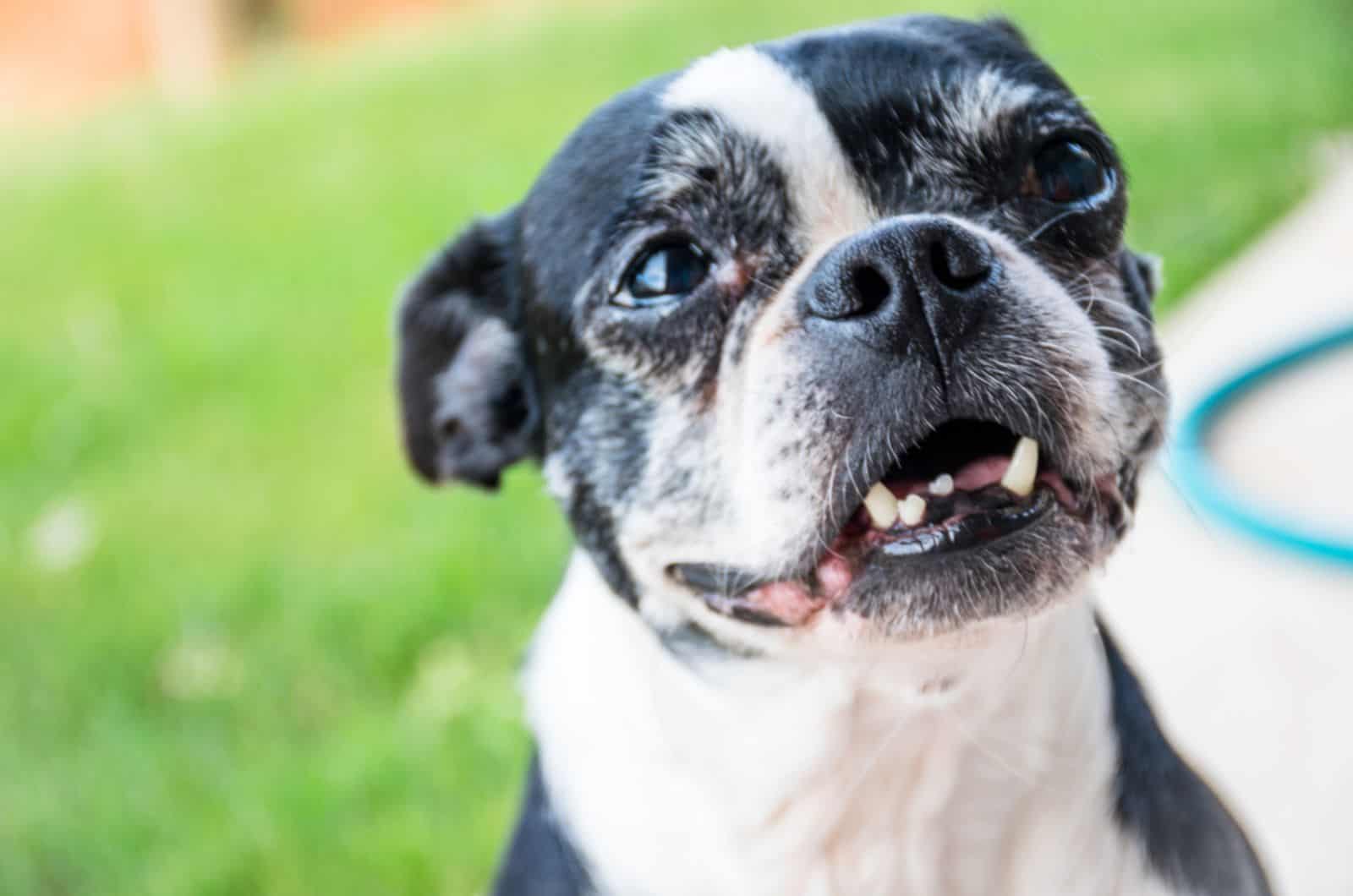
At What Age is A Boston Terrier Considered A Senior?
The average age at which a Boston Terrier is considered an adult is 8 years of age. It’s the transitioning point at which his metabolism starts to slow down and he may even need a swap of kibble to something more digestible for senior dogs.
What Is The Leading Cause Of Death For Boston Terriers?
While there is some debate every year, the current leading cause of death appears to be heart disease, followed by neurological issues and cancer.
Old age would be there too, but that doesn’t really count as an abnormal cause of death.
What’s The Longest A Boston Terrier Has Lived?
While the average may be 11 to 13 years, there are a few Boston Terriers who have made it all the way to year 15, and that in and of itself is an incredible achievement.
What Is The Average Weight Of A Boston Terrier?
I’ve mentioned it a bit earlier, but the average weight range for an adult Boston Terrier is anywhere from 15 to 25 pounds for males with the range being slightly lower for the females going from 10 to 20 pounds of weight.
Because pups put weight on fast and one can’t really encompass their intended weight range per month without going into another full blown article, I advise you check out a Boston Terrier growth or feeding chart for that information.
How Much Should I Be Feeding My Boston Terrier Daily?
Once again, it drastically depends on his age, but an average adult Boston Terrier will eat anywhere from 1 to 1 and 3/4 cups per day divided into 2-3 equal portions.
Does Boston Terrier Coat Color Influence His Lifespan In Any Way?
Not particularly. There are some dog breeds who have white coat color who may be more prone to deafness, but the Boston Terrier in particular, regardless if he was brindle and white, black and white or seal and white, will be the same.
Other genetic markers influence his health, this one is just purely cosmetic.
In Conclusion
The Boston Terrier lifespan is relatively average for a small, brachycephalic dog breed like him.
Most only live up to around 11, maybe 12 years of age, but, through proper training, dieting and exercise as well as keeping up with problematic symptoms, and with their vaccinations and daily check-ups, they can even go up to 13 years.
There are reports of some Boston Terriers even making it to year 15, but those appear to be extremely rare cases.
There are things you can influence and some things that are sadly built into your doggo that you can’t control quite just yet.
But, considering everything, what’s offered at the moment is pretty generous, so make sure you’re there for your dog every step of the way and that you can both enjoy the time you have together, no matter how long it may be.
Whatever the case may be, I’m sure that you’ll take real good care of him and ensure that he has a good life. Until next time, pet parents.
RELATED LINKS:
- Is The Teacup Boston Terrier The Right Dog Breed For You?
- 8 Best Boston Terrier Breeders In Florida
- Brown Boston Terrier: Interesting Facts & Characteristics
- Male Vs Female Boston Terrier – Which One Should You Choose?
- Blue Boston Terrier: An American Gentleman Ready To Charm You
- Are Boston Terriers Hypoallergenic? Find The Truth Here
- 9 Boston Terrier Colors That You Will Adore
